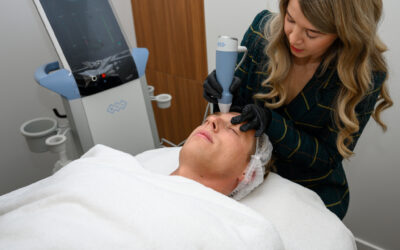Let’s cut to the chase: Vitamin A is widely determined as the champion ingredient of dermatology.
Many of you may be aware that Vitamin A is a commonly used ingredient in skincare, but the fundamental element is how much Vitamin A is in the product and how it relates to your own current levels of Vitamin A. It must be of relative significance to make a change. Buying a ‘Retinol’ product off the shelf isn’t necessarily going to be at an optimal dose for your skin and you can run the risk of having a transitional reaction or intolerance to Vitamin A. It’s super important that Vitamin A is administered progressively. This is where your Medical Skin Therapist comes in – they have the expertise to ensure you get the best from your product.
Vitamin A derivatives are key ingredients in transforming your skin from dull, pigmented, red, dry, sensitive and lax into luminous, firmer, beautiful and healthy skin.
While there’s no denying Vitamin A’s importance, the terms and types of A can be confusing as well as their relation to skin health.
Vitamin A is a necessary nutrient for many different functions in the skin but it’s very unstable as UV breaks it down literally hour by hour, daily, leaving skin impaired and less able to defend itself from further UV damage. Among many things, Vitamin A is responsible for healthy cell turnover, hydration, pigment control and collagen production. Your skin cells literally wouldn’t exist without it.
There are several different types of Vitamin A:
- Retinyl Palmitate
- Retinal Acetate
- Retinyl Propionate
- Retinol
- Retinal Retinoic acid
The less active forms of Vitamin A are Retinyl Palmitate and Acetate, which must be used in much higher doses to achieve any change in the skin but are also able to be used during the day as they are not photosensitive and make for great UV protection. This inhibits the degradation of the Vitamin A already in your skin and offers UV protection.
Ultimately, the goal is to initiate what is known as ‘Gene Transcription’, this is where appropriate doses of retinoids can repair damaged skin cell DNA. Over time our DNA becomes damaged from UV and when new sister cells are produced it repeats the damage or mutation in the DNA. Vitamin A in the correct type and dosage can help initiate some repair to the DNA.
This will lead to less pigment, better hydration, less sensitivity, thicker skin exhibiting less fine lines and wrinkles and reduced pore size, a.k.a. beautiful healthy skin.
Clearly, it’s not a ‘one size fits all’ solution. To optimise the transition to beautiful skin it’s essential to see your TFP Medical Skin Therapist. They can expertly assess what is required for your specific skin type to achieve significant change. When considering an appropriate Vitamin A product they will prescribe one based on:
- Type
- Dosage
- Frequency
And it doesn’t stop there. It’s essential for you to potentially change the type of A you are using and increase the dose over time to continue to make change, on the other hand, there may be times this may need to be reduced.
Your Skin Guru,
Lauren






